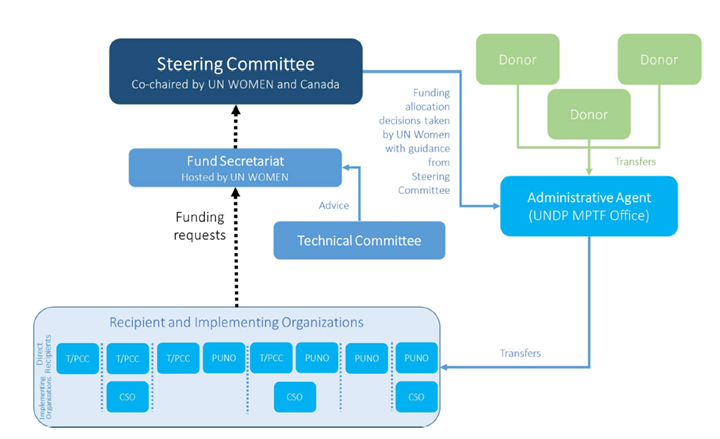ObjectivesFund scope
United Nations peace operations assist countries in navigating the challenging path from conflict to peace. While approaches have evolved over the past decades—to give a voice to women whose meaningful involvement has helped prevent and resolve conflicts, and rebuild in the aftermath—the number of deployed women peace and security personnel remains too low with only 14.5% of uniformed women police officers and 4.7% military personnel. Since 2015, the increase has been a meagre 0.8% (from 4.2% to 5%) in the number of women involved in United Nations peace operations. At this rate, it will take decades to reach targets outlined in United Nations Security Council resolution 2242. Based on the idea that financial means should not impede the advancement of gender equality, the United Nations and Government of Canada launched the Elsie Initiative Fund to support and incentivize an increase in the meaningful participation of uniformed women in United Nations peace operations.
Strategic and results framework
The Elsie Initiative Fund, named after Canadian women’s rights pioneer Elsie MacGill (1905-1980), identifies and overcomes barriers to deploying trained uniformed women peacekeepers. Barriers include, but are not limited to, giving women the equal opportunity to deploy, reducing criteria that exclude women, providing women with the necessary working and living conditions to fully take part in peace operations, and experience equal treatment while on deployment.
Although not all barriers are addressed through financial resources, additional financing helps identify the most significant obstacles based on national context and gives stakeholders an opportunity to test innovations that address them. The Fund complements existing United Nations peace operations financing mechanisms and is the first instrument to focus specifically on the deployment of uniformed women in peace operations.
As per the Department of Peace Operation's Uniformed Gender Parity Strategy, the Elsie Initiative Fund accelerates progress towards achieving various United Nations targets by increasing the percentage of uniformed military and police-women serving in peace and security operations. Four outcomes laid out in the results framework relate to:
- Expanding country knowledge of barriers to deployment (uniformed women to peace and security operations).
- Increasing meaningful deployment of uniformed women peacekeepers to United Nations missions.
- Increasing the pool of uniformed women eligible to deploy as peacekeepers.
- Improving working conditions for uniformed women in United Nations missions.
Primary recipients of the fund are troop- and police-contributing countries (T/PCCs). United Nations organizations that wish to implement and pilot innovative responses have secondary access. Monitoring, reporting, evaluation and context-specific risk mitigation strategies are developed as part of each proposal submission.
Funding streams
Funding under the Elsie Initiative Fund falls into two streams: flexible project and premiums for gender-strong units. In the second funding modality, funds are allocated to a T/PCCs as a premium for a gender-strong unit. Flexible project funding is used to undertake a barrier assessment to the deployment of uniformed women to United Nations peace operations or off-set project costs to remedy some or all of the obstacles identified within a T/PCC’s barrier assessment. Member States contributions support military and police personnel peace operations and/or United Nations organizations in rolling out evidence-based activities, increasing the deployment of qualified uniformed women over the short and long terms. Proposals through this funding stream might include training and mentorship programs for commanders and senior personnel, infrastructure investments, national recruitment campaigns to attract more women into service, and training for women personnel who hope to be deployed.
The second set of funds are allocated to T/PCCs as premiums for gender-strong units. A gender-strong unit is a military contingent or a formed police unit that has a substantial representation of women including in leadership and command positions, and (some in positions of authority), where all unit members have taken in part in gender-equity training, and where adequate equipment or other measures are in place to ensure parity of deployment conditions for all peacekeepers, regardless of gender.





